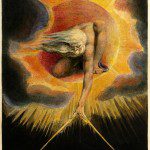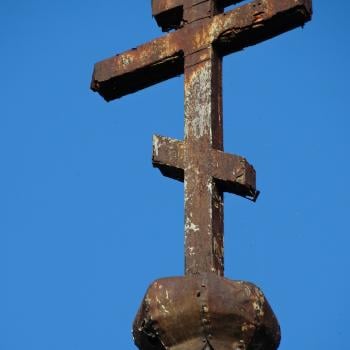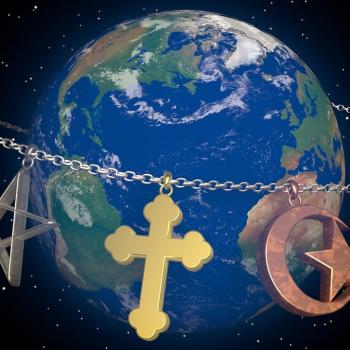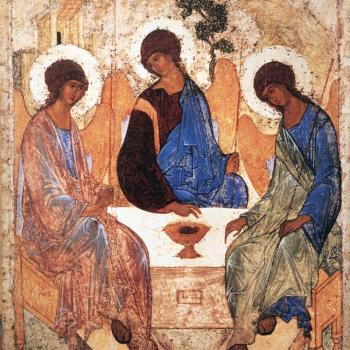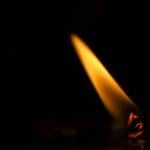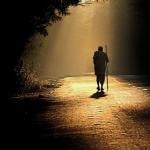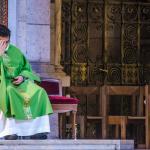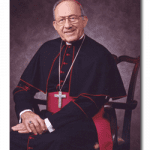![God as Architect/Builder/Geometer/Craftsman, The Frontispiece of Bible Moralisee By Anonymous (archiv.onb.ac.at), via Wikimedia Commons [Public domain]](https://wp-media.patheos.com/blogs/sites/637/2016/07/God_the_Geometer-219x300.jpg)
In the beginning was the Word, and the Word was with God, and the Word was God. He was in the beginning with God; all things were made through him, and without him was not anything made that was made (Jn. 1:1-3 RSV).
Insofar as all things remained true to themselves, true to their nature, they can be seen as reflections of the Logos. To do this, they had to remain open to God, to the Spirit of God, so that their existence can be preserved. For all contingent beings, without the power of grace, will degrade over time, and become less than what they were called to be by nature. Those who choose to close in on themselves and their own limited glory close themselves off from the Spirit of God, and the glory which the Spirit is willing to give them. They law of contingency takes effect and so they lose much of the goodness given onto them by their nature, becoming as it were, less than themselves over time, indeed, less than natural because they do not keep to their natural purity.
It can seem ironic that those who try to hold on to themselves lose themselves and become less than themselves. The reason why this is so is rather simple. Contingent beings are not the source of their own being. When they close themselves off from the source of being, the effects of that closure quickly manifests itself in the degradation of their own being. There are many ways this law has been described, from the law of karma, to the law of entropy, or in Christian spirituality, the law of death.
Closed off from God, we find ourselves the walking dead. That which gives vitality to our being, that which preserves us and lifts us up is denied by us, so that though we live on, we do not live on in fullness. We have the remnants of life, the remnants of our good nature, and this allows us to continue on, but we are closed off from the true life and from the vision of God and the beatitude which comes from that vision. We stumble around, eating and feeding on the rest of the world, using such nourishment to help replenish our bodily needs so that we can continue on in our living death, constantly fighting against death through the use of death, through the destruction of others who we then feed upon. We use the remnants of their life to add to our own and give us just a little more grasp at life.
As the walking dead, we find ourselves stumbling about, neither truly alive, nor completely dead. Our natural abilities are diminished. We are not entirely mindless and senseless, just as we are not yet completely dead: we are just mostly dead. With the remnants of our being left, we see and experience a little of the light of life and encounter it; if we open up to it and allow it to enter us, we will find it slowly giving us more of the true life, lifting us beyond the law of death. But the problem is we often close ourselves from it, afraid of the light, and so blind ourselves through the fortification of our living death as we sin, hindering our ability to perceive and embrace that light in our life. For this reason, it comes to us in a form which we can more readily interact with, as the Logos becomes man and engages us face to face. Those who welcome him therefore are given the light of life, the spiritual healing which brings them back to life and allows them to become children of the most high:
He came to his own home, and his own people received him not. But to all who received him, who believed in his name, he gave power to become children of God; who were born, not of blood nor of the will of the flesh nor of the will of man, but of God (Jn. 1:11-13 RSV).
The fullness of God, the fullness of Being, has become man. Despite closed off from him in our state of living death, we see shown the brightness of the true life. Through it, we can examine ourselves, see what we have made for ourselves apart from it. Hopefully we will recognize the nothingness of being which we have in ourselves, which we have placed in ourselves, for then we will be that much more willing to open ourselves up and let his fullness of being fill us up with grace upon grace: “And from his fulness have we all received, grace upon grace” (Jn. 1:16 RSV).



